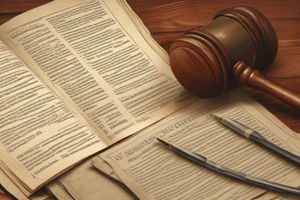Podcast
Questions and Answers
What is the purpose of adopting a code of conduct in a public school?
What is the purpose of adopting a code of conduct in a public school?
- To establish a punishment system for learner misconduct
- To suspend or expel learners who misbehave
- To create a disciplined and purposeful school environment (correct)
- To punish educators who fail to maintain discipline
Who is responsible for adopting a code of conduct in a public school?
Who is responsible for adopting a code of conduct in a public school?
- The School Governing Body (SGB) (correct)
- The Provincial Education Department
- The principal or his/her delegate
- The Minister of Education
Under what circumstances can a principal or their delegate conduct a random search of learners or their property?
Under what circumstances can a principal or their delegate conduct a random search of learners or their property?
- Only during school hours
- With the permission of the learners' parents
- When a fair and reasonable suspicion has been established (correct)
- At any time without reason or suspicion
What is prohibited from being brought onto school premises or possessed during a school activity?
What is prohibited from being brought onto school premises or possessed during a school activity?
Who is responsible for managing suspension and expulsion of learners?
Who is responsible for managing suspension and expulsion of learners?
What document outlines the rules and consequences for learner misconduct?
What document outlines the rules and consequences for learner misconduct?
What is the consequence for learners who arrive late for class according to the school rules?
What is the consequence for learners who arrive late for class according to the school rules?
What is the punishment for learners who cheat in an assignment or test according to the school rules?
What is the punishment for learners who cheat in an assignment or test according to the school rules?
Can a teacher use corporal punishment on a child if the parent has given permission?
Can a teacher use corporal punishment on a child if the parent has given permission?
What is the purpose of the uniform demerits issued by a RCL member?
What is the purpose of the uniform demerits issued by a RCL member?
What is the consequence for learners who do not complete their homework according to the school rules?
What is the consequence for learners who do not complete their homework according to the school rules?
Is the teacher in charge of the first soccer team allowed to initiate new team members by shaving their heads and making them wear short pants?
Is the teacher in charge of the first soccer team allowed to initiate new team members by shaving their heads and making them wear short pants?
What is the consequence for learners who have their phones confiscated during school hours?
What is the consequence for learners who have their phones confiscated during school hours?
What is the purpose of the school rules regarding learner behavior?
What is the purpose of the school rules regarding learner behavior?
What is the key principle of the concept of 'Audi alteram partem'?
What is the key principle of the concept of 'Audi alteram partem'?
What is the primary purpose of Section 10 of the SASA?
What is the primary purpose of Section 10 of the SASA?
What is the term for acting outside of one's legal authority or beyond one's mandate?
What is the term for acting outside of one's legal authority or beyond one's mandate?
Which of the following is a legal framework related to learner misconduct?
Which of the following is a legal framework related to learner misconduct?
What is the primary consideration when determining the reasonableness of a disciplinary action?
What is the primary consideration when determining the reasonableness of a disciplinary action?
Who has the authority to discipline learners, according to the SASA?
Who has the authority to discipline learners, according to the SASA?
Flashcards are hidden until you start studying
Study Notes
Learner Misconduct
- Lawfulness of learner misconduct involves checking if there is a law or rule, if the rule is consistent with the law and Constitution, and if the person has the authority to act.
- SASA empowers school authorities to discipline learners, but it is beyond the law to delegate this authority to a learner.
Reasonableness
- A rule is reasonable if it is proportional, not arbitrary or irrational, and serves a greater public interest than individual rights infringed.
Fairness
- Fairness involves procedural issues and a fair process, ensuring that no person is judged without a fair hearing.
Legal Concepts
- Ultra Vires: acting outside of legal authority or beyond one's mandate.
- Audi alteram partem: no person should be judged without a fair hearing in which each party is given the opportunity to respond to the evidence against them.
Legal Framework Relating to Learner Misconduct
- SASA (Minister of Basic Education):
- Section 8: Code of conduct
- Section 8A: Random search and seizure and drug testing
- Section 9: Suspension and expulsion
- Section 10: Prohibition of corporal punishment
- Section 10A: Prohibition of initiation practices
- National regulations/policy/guidelines:
- Guidelines for the Consideration of Governing Bodies in adopting a Code of Conduct (includes Due Process requirements)
- National Policy on the Management of Drug Abuse by Learners in Public and Independent Schools and Further Education and Training Institutions
- Provincial Regulations (MEC):
- Misconduct of Learners at Public Schools and Disciplinary Proceedings (e.g. PN 6903 in Gauteng)
- Provincial policy (HOD):
- e.g. Circular 74/2007 management of suspension and expulsion
- School Code of Conduct (SGB)
- Classroom Rules (Teacher)
Section 8 - Code of Conduct
- A governing body of a public school must adopt a code of conduct for learners after consultation with learners, parents, and educators of the school.
- The code of conduct must aim to establish a disciplined and purposeful school environment, dedicated to the improvement and maintenance of the quality of the learning process.
Section 8A - Random Search and Seizure and Drug Testing
- No person may bring a dangerous object or illegal drug onto school premises or have it in their possession on school premises or during a school activity without authorization.
- The principal or their delegate may search a group of learners or their property for dangerous objects or illegal drugs if a fair and reasonable suspicion has been established.
School and Classroom Rules
- Acceptability of school and classroom rules:
- Learners who talk in assembly will be instructed to stand up (others are seated on the floor/ground)
- Learners who arrive late for school will be required to attend detention on the same day
- Learners whose uniform is incorrect will be issued with uniform demerits
- Learners who arrive late for class will not be allowed entry to the classroom for the duration of the lesson
- Learners who do not complete their homework will have to attend four break detentions
- Learners who cheat in an assignment or test will be expelled by the Governing Body
- Initiation practices (e.g. shaving heads and making new team members wear short pants) are prohibited
- Corporal punishment is prohibited, even with parental consent
Studying That Suits You
Use AI to generate personalized quizzes and flashcards to suit your learning preferences.




